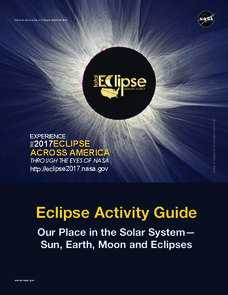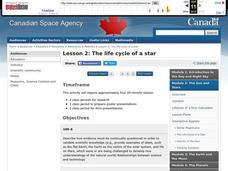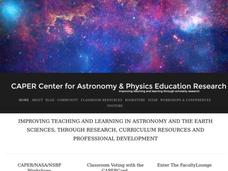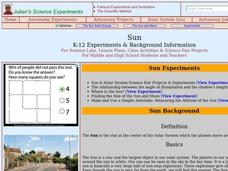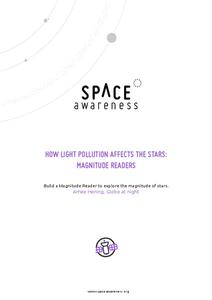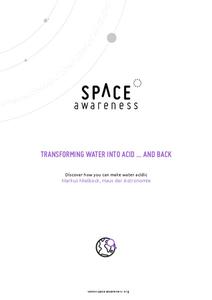NASA
Eclipse Activity Guide
Ever made solar s'mores? Or recreated the solar system using peanuts? Astronomers young and old investigate all things solar using a variety of activities. Explore how the sun works, types of light it emits, and methods of charting the...
American Museum of Natural History
Solar System Scavenger Hunt
Scholars go on a hunt to locate objects that best fit the measurements to create an eye-catching scale model of the solar system.
American Museum of Natural History
Journey to the Stars
Fifteen detailed pictures and informative captions delve deep into the exploration of stars—their life cycle and importance in the universe.
NASA
Tools of the Trade
Did you know every state in the U.S. has at least one observatory? During the lesson, scholars research the cost of building and maintaining an observatory. They must present their information in a proposal to build a new observatory,...
Glynn County School System
Cosmology
The past, the present, and the future ... there's so much to discover about the galaxy. Scholars learn about the creation of the universe, its current structure, and how it is changing. The PowerPoint presentation begins with a...
National Center for Case Study Teaching in Science
The Zarkah Stone
Astronomy stars read the account of the Zarkah meteorite that struck thickly populated Park Forest, Chicago in 2003. In doing so, they differentiate between meteors, meteorites, and meteoroids. They will also be able to explain...
Curated OER
Astronomical Data
In this astronomy worksheet, students use a chart with planetary data comparing the inner planets to each other. Students will use the period of rotation, period of revolution, and distance from the sun for these inner planets to...
Curated OER
Tides
Young scholars discover how the position of the Sun, Moon and Earth affect tides. In this science lesson, students view a presentation about the tides. Young scholars discuss the different types of tides.
Curated OER
The Seasons of the Earth
In this seasons worksheet, 3rd graders study a diagram that shows the Earth's rotation around the sun as it relates to the seasons. They describe the position of the Earth during each season in a short answer format.
Curated OER
Soil Comparison and Analysis
Students perform tests on different soil samples. In this earth science activity, students classify the soil into groups according to test results. They write a lab report following a certain criteria.
Curated OER
Introduction to the Day and Night Sky
Students explore space science by participating in a sky observation activity. In this astronomy instructional activity, students define a list of astronomy vocabulary terms and examine star charts of the four seasons. Students gather...
Curated OER
Illustrate the Constellations
Students explore space science by participating in a star identification activity. In this astronomy lesson plan, students identify different star patterns and discuss the movement of stars across the sky as the seasons change. Students...
Curated OER
Meteorites
Students model how meteors fall to the surface of planets. In this space science lesson, students identify different types of meteorites using an interactive online website. They investigate the relationship between a meteorite's size...
Curated OER
The Life Cycle of a Star
Students investigate the life cycle of a star and make conclusions based on evidence, research, and observation. In this lesson on space and scientific investigation, students describe the relationships between science and technology...
Curated OER
Observing and Sketching the Lunar Surface
Students explore space science by conducting an illustration activity. For this lunar lesson, students discuss what the moon is and the role it plays for our environment on Earth. Students view images of the moon and utilize chalk to...
Curated OER
The Expanding Universe
Students explore the expanding universe. In this science lesson, students use balloons to model the expansion of the universe. Students take measurements of the balloon expansion and answer questions directed to develop their...
Curated OER
Sun
Learners study how the sun is at the center of the solar system. In this solar lesson students measure the altitude of the sun and its size.
Curated OER
Distances to Stars
Students explore the idea of parallax. In this astronomy lesson, students study the distances of stars. They investigate how parallax can be used to determine these distances.
Curated OER
Moon Phases
Five multiple choice questions are provided in the handout about the phases of the moon. A digaram is included to help astronomy learners answer the questions. The diagram is meant to represent the appearance of the moon from the...
Space Awareness
How Light Pollution Affects the Stars: Magnitude Readers
Did you know light can decrease visibility? Light pollution absolutely makes it more difficult to see stars. Scholars build a simple magnitude reader to determine the magnitude of stars. They use these data to estimate the impact of...
Space Awareness
Transforming Water Into Acid ... And Back
Greenhouse gases affect marine wildlife in life-threatening ways. Through experimentation, your classes explore the acidification of water from the main greenhouse gas carbon dioxide. As they introduce carbon dioxide to water, a pH...
Space Awareness
Model of a Black Hole
Even light cannot leave the force of a black hole! Learners use a model to explore the gravitational force of a black hole. An elastic bandage and heavy ball serve to create the hole, while marbles become the victims of its strong force.
Glynn County School System
Light, History, Gravity, Distance, Relativity, and Space-Time
Let the star's color be the guide! The color of a star indicates its temperature and its mass and distance affect the gravitational force. The lesson presentations address these concepts as well as how the theory of special relativity...
NASA
Taking Apart the Light
Break down light into spectra. Scholars learn how atoms emit and absorb photons and come to understand how this process allows scientists to identify different atoms based on either absorption lines or emission lines. Learners then...


